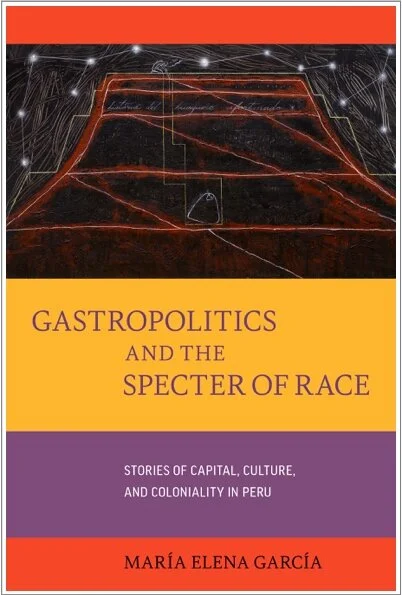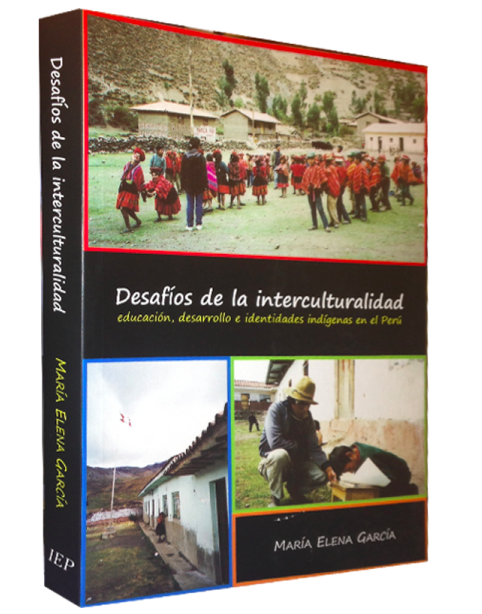García’s writing explores the politics of race, indigeneity, violence, and more-than-human life in contemporary Peru. Her most recent book examines the transformation of Peru into a leading global culinary destination, focusing in particular on the ways this “gastronomic revolution” remains haunted by long histories of race and coloniality. García also pays attention to the guinea pig—or cuy—in this story, exploring the significant boom in cuy production over the past two decades. The book is now available in Spanish as Gastropolítica. Una mirada alternativa al auge de la cocina peruana (2023, Instituto de Estudios Peruanos). You can find that book here. Her next project, Landscapes of Death: Political Violence Beyond the Human in the Peruvian Andes, considers the impact of political violence in Peru on more-than-human lives and bodies.
Gastropolitics and the Specter of Race (Winner of the 2022 Flora Tristán Prize for Best Book on Peru, Peru Section, LASA)
"María Elena García offers a powerfully told story of the gastropolitical revolution in Peru, with a critical, intimate approach that departs from the often celebratory reception of the phenomenon. García links the recent branding of Peruvian cuisine to longstanding violence and extraction of the nation’s resources at the expense of indigenous Andean peoples and other earth beings."––Florence E. Babb, author of Women's Place in the Andes: Engaging Decolonial Feminist Anthropology
"An absolutely original account of Peru's gastronomic boom, which involves the supposed uplifting of Indigenous foods and the country's shedding of its violent past. Through a series of gripping accounts—from the genetic modification and slaughter of guinea pigs to the militarism hiding in the kitchens of five-star restaurants—the book draws connections between gastropolitics, violence, and patriarchy from south to north. Grappling with the contradictions between the cultural opening to Native foods and the durability of racial thought, Gastropolitics and the Specter of Race exposes the desires and aesthetics of settler coloniality at the heart of Peru’s new cuisine."––Bret Gustafson, author of Bolivia in the Age of Gas
"Gastropolitics and the Specter of Race is a stunning meditation on how Peru's much-feted Gastronomic Revolution reenacts older histories of settler colonialism and racial capitalism even as it insists that shared love for food can heal violent pasts. García's riveting and deeply moving storytelling, at once intimate and historical in scale, takes us through a culinary world haunted by logics of extraction, accumulation, and devastation. And yet, as García powerfully and persuasively demonstrates, Indigenous refusal of erasure creates alternate possibilities for life and futures even in landscapes marked by violence and death. A truly remarkable book that offers a profound reflection on the relationship between race, species, and capital."––Radhika Govindrajan, author of Animal Intimacies: Interspecies Relatedness in India’s Central Himalayas
“Gastropolitics and the Specter of Race offers an altogether timely, innovative, and exquisitely written reflection on the politics and spectral hauntings of Peru’s gastronomic revolution. In writing of race, capital, and violence in the realm of the culinary, María Elena García moves deftly from incisive explorations of the tastes and spectacles of Peru’s contemporary culinary delicacies to insightful analyses of the colonial histories and global politics that inform the stories of Peru.” ––Robert Desjarlais, author of The Blind Man: A Phantasmography
You can read a review of Gastropolitics and the Specter of Race here.
Making Indigenous Citizens
García has fashioned a book that’s terrific in every way. Her subject is the politics culture, tradition, and identity in the Andes, and it’s the best thing I’ve ever read on the topic in as long as I can remember. I feel certain that Making Indigenous Citizens will become a key book in scholarship about the Andes and Latin America.
—Orin Starn
Professor of Cultural Anthropology
Duke University
Desafíos de la Interculturalidad
La autora examina las paradojas y posibilidades de las protestas lideradas por comunidades quechua-hablantes en contra de la educación intercultural bilingüe, y las aparentes contradicciones en la política intercultural, este libro demuestra como movimientos sociales y ciudadanía se articulan de manera sorprendente.
—Instituto de Estudios Peruanos
Recent Publications
2020. “Devouring the Nation: Gastronomy and the Settler-Colonial Sublime in Peru.” Latin American and Caribbean Ethnic Studies.
2019. “The Gastro-Political Turn in Peru.” With Raúl Matta. Anthropology of Food, 14.
2019. “Death of a Guinea Pig: grief and the limits of multispecies ethnography in Peru.” Environmental Humanities, 11 (2).
2016. “The Taste of Conquest: Colonialism, Cosmopolitics, and the Dark Side of Peru’s Gastronomic Boom.” Open Anthropology: A Public Journal of the American Anthropological Association, Vol. 4 (2). Re-printed from Journal of Latin American and Caribbean Anthropology, Vol. 18 (3): 505-524.
2014. “Culinary Fusion and Colonialism: A Critical Look at the Peruvian Food Boom.” ReVista: Harvard Review of Latin America, Fall 2014. A version of this article also appears in Spanish as “Fusión Culinaria y Colonialismo: Una Mirada Crítica al Boom de la Cocina Peruana”:


